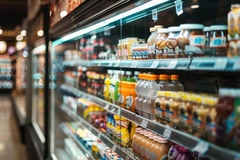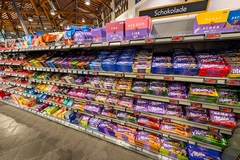
- Industry news
Industry news
- Category news
Category news
- Reports
- Key trends
- Multimedia
- Journal
- Events
- Suppliers
- Home
- Industry news
Industry news
- Category news
Category news
- Reports
- Key trends
- Multimedia
- Events
- Suppliers
Danisco's sugar and flavours businesses dissappoint

The ingredients sector was affected by the weak flavour market in Europe, while the European sugar market was affected by the cold 2004 summer and the intensified obesity debate.

21/06/05 Food ingredients giant Danisco has reported organic growth of 2% in 2004/05 for Ingredients and Sweeteners, while its sugar business suffered. The ingredients sector was affected by the weak flavour market in Europe, which the company says came as a result of the cold summer in Europe last year and subsequently by declining citrus and vanilla prices. The flavour division therefore contributed negative growth of 8% in 2004/05.
Danisco reported that the European sugar market was impacted negatively by a number of factors and the company only managed to offset this impact via increased exports, but at lower prices than normally. Revenue from sugar sales etc. rose 3% to DKK 8,155 million (DKK 7,941 million) in 2004/05. The increase is mainly due to increased sales volumes, with sugar exports being particularly large, Danisco said. The higher exports were a result of lower sales to the home market, which was unfavourably affected by the cold summer in 2004 and the intensified obesity debate, which especially hit sugar sales to the beverage industry, the company claimed.
Sales volumes for sweeteners were negative by 4% in Q4, which the Danish supplier said is attributable to robust sales for low-carb applications in North America in Q4 last year. Meanwhile there have been fewer product launches within the low-carb segment, which dampened sales of Litesse (polydextrose).
The Texturant Systems business area for emulsifiers, stabilisers and functional systems recorded organic growth of 3%. This covers a 1% drop in sales volumes and, accordingly, higher sales prices due to higher raw material prices. The North American market progressed in particular. The Asian market also recorded strong growth except within functional systems where some customers still prefer to undertake blending themselves, and prices have been under pressure.
Speciality products (flavours, cultures, enzymes etc.) recorded organic growth of 0%. Currency-adjusted growth surged 28% due to the acquisition of Rhodia Food Ingredients. Danisco's original culture activities generated 22% growth for the year driven by the synergies from the integration of Rhodia.
Danisco reported that it expects its Genencor acquisition to contribute DKK 2.4 billion to Danisco's revenue in 2005/06, and Genencor Bioproducts to contribute around DKK 500 million to Danisco's EBITDA, which is in line with fiscal 2004 adjusted for nonrecurring income, and around DKK 200 million to Danisco's EBIT.
In the course of the next three years Danisco says that it expects to realise sales and costs synergies of up to DKK 200 million from the acquisition, which will mainly be obtained in the last part of the three-year period on account of major investments in developing the company's product portfolio already in 2005/06. Coupled with Genencor's own growth forecast this means that return on invested capital in the third full year after the acquisition is expected to exceed the capital cost (WACC) of 7.5%, thereby fulfilling our financial targets. Adding the expected synergies to Genencor's own EBITDA for 2005/06 gives an implied multiple on invested capital of just under 8 times.










